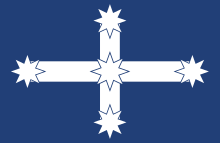Eureka Stockade
As Eureka Stockade ( Engl. , Eureka : eureka , stockade : Palisade) is an armed uprising in 1854 in Ballarat in today's Australian state of Victoria called. It is one of the most momentous events in Australian history and created the framework for the establishment of a sovereign Australian state.
background
In the mid-19th century, the discovery of large gold deposits in Victoria led to several large waves of immigration from abroad. The city of Ballarat developed into a center of the Australian gold rush . The prospectors suffered from high license fees, had no right to vote and were not allowed to run for candidacy if they did not own any land. They were also subject to widespread arbitrariness and reprisals from officials and police. Petitions and letters of complaint in the capital, Melbourne , had no effect, so that large gatherings of up to 10,000 gold prospectors protested for more rights. After the murder of a well-known gold prospector in November 1854 had no legal consequences, the Eureka Hotel was burned down in response . A few days later, the Ballarat Reform League ( Ballarat Reform League ) was founded, at whose mass gatherings the Eureka Stockade flag was hoisted for the first time. A delegation was sent to Governor Hotham, who u. a. called for prisoners to be released and for universal suffrage. Hotham refused all demands and sent several contingents of troops to Ballarat. The following government reprisals against prospectors in December 1854 escalated the heated situation.
revolt
The Eureka Stockade uprising began on December 1, 1854 with the construction of barricades on a main road to Melbourne. Irish immigrant Peter Lalor led the rebellion. But even he could not prevent most of the insurgents from leaving the defensive positions after a few days. In the early morning of December 3, the approximately 120–200 insurgents were surprised by the attack of the 12th and 40th regiments of the British Army and police troops (a total of 276 men). After a brief skirmish, the prospectors had to give up. 22 insurgents were killed and 12 wounded, and the attackers counted 6 dead. The injured Peter Lalor escaped and was arrested a few days later.
consequences
On December 23, 1854, the trial of thirteen ringleaders began at the Supreme Court of Victoria in Melbourne. The charge was high treason, the allegation of which could be refuted because of lack of evidence. The acquittal was received euphorically by the population. Given the positive reactions and obvious sympathy for the insurgents among the people, another charge was dropped and governor Hotham relented. Universal suffrage was introduced, license fees were replaced by a tax and fee system, and prospectors were given relative legal autonomy and a say in the legislative chamber of parliament. Peter Lalor became the first elected representative. In December 1855, one year after the Eureka Stockade uprising, all of the gold prospectors' demands were finally implemented.
Individual evidence
- ↑ Archive link ( Memento from April 7, 2012 in the Internet Archive )
- ↑ Archived copy ( Memento of the original from April 8, 2009 in the Internet Archive ) Info: The archive link was inserted automatically and has not yet been checked. Please check the original and archive link according to the instructions and then remove this notice.
